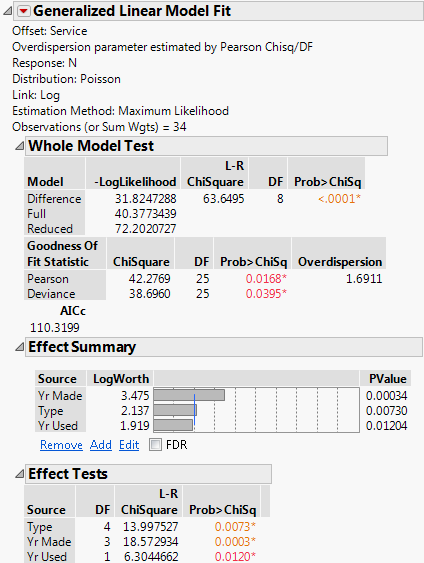Poisson Regression with Offset
The sample data table Ship Damage.JMP is adapted from data found in McCullagh and Nelder (1989). The data table contains information about a certain type of damage caused by waves to the forward section of the hull. Hull construction engineers are interested in the risk of damage associated with three variables: ship type (Type), the year in which the ship was constructed (Yr Made), and the block of years the ship was in service (Yr Used).
In this analysis we use the variable Service, the log of the aggregate months of service, as an offset variable. An offset variable is one that is treated like a regression covariate whose parameter is fixed to be 1.0. Offset variables are most often used to scale the modeling of the mean in Poisson regression situations with a log link. In this example, we use log(months of service) since one would expect that the number of repairs be proportional to the number of months in service.
To see how an offset variable is used, assume the linear component of the GLM is called η. Then, with a log link function, the model for the mean with the offset included is specified as follows:
exp[Log(months of service) + η] = [(months of service) * exp(η)].
To run this example, follow these steps:
1. Select Help > Sample Data Library and open Ship Damage.jmp.
2. Select Analyze > Fit Model.
3. From the Personality list, select Generalized Linear Model.
4. From the Distribution list, select Poisson.
In the Link Function list, Log should be selected for you automatically.
5. Select N and click Y.
6. Select Service and click Offset.
7. Select Type, Yr Made, Yr Used and click Add.
8. Click the check mark box for Overdispersion Tests and Intervals.
9. Click Run.
From the report, notice that all three effects (Type, Yr Made, Yr Used) are significant.
Figure 12.7 Partial Report for a Poisson with Offset Model
